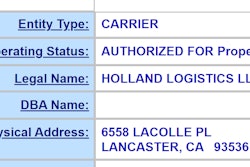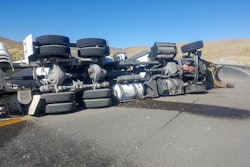Joseph Caprarulo has been driving trucks since 2006 and has seen good times and bad under a variety of carriers, working alternately as an employee and a contract driver with an eye toward going owner-operator some day.
Caprarulo, now 68, rides with his son Anthony, who takes care of the non-driving tasks. Recently, with the freight market bottoming out and the last company he pulled for shuttering just before Christmas, Caprarulo signed on to a contract-driving gig with Daniel Krizanac, someone he'd known for years from other fleets in the Chicago area, and someone who promised him steady work and pay.
But on Monday, the Caprarulos found themselves essentially facing homelessness, stuck in a motel they were paying for as one of Krizanac's fleet Cromex's trucks disappeared in the Chicago area. Caprarulo had initially been promised he'd be paid that very day, yet now approaching a week into the ordeal the Caprarulos haven't heard from Krizanac since Friday, and the $3,000 or so they say he owes them looks unlikely to materialize.
"It was an older KW with a lot of mileage on it, and we were always bringing it into the garage getting it fixed," he said. "It had the smallest tank and wasn’t getting good fuel miles, burning almost faster than we could put it in."

 According to Caprarulo, texts from Krizanac show he had been promised payment to come this past Monday. It never came as he and Anthony lived out of a motel over Easter weekend. Later on in the text thread, the promise of payment was withdrawn -- "you won't get s*** now."
According to Caprarulo, texts from Krizanac show he had been promised payment to come this past Monday. It never came as he and Anthony lived out of a motel over Easter weekend. Later on in the text thread, the promise of payment was withdrawn -- "you won't get s*** now."
There in that fifth day in a motel, on Monday, in Elgin, Illinios, the younger Caprarulo fired off a cry for help on Twitter, which eventually made it to the desk of the Truckers Emergency Assistance Responders, a nonprofit group that serves as a lifeline to drivers suffering from carrier abandonment, accidents, medical episodes and wage theft of the kind that appeared to be happening to the Caprarulos.
Fellow driver and Real Women In Trucking President Desiree Wood heads the TEAR group, and she said Caprarulos' story bears all the hallmarks of a ring of serial offenders in the Chicago area who seem to prey on vulnerable drivers.
"This is the first time I got dropped like a rock," said Caprarulo. "I always had some back-up plan, but now I'm in an empty dump in the middle of Chicago. Over the years, I've always helped a driver down on their luck with a few bucks, or buy them a meal, but now the shoe is on the other foot."
Wood referred to Caprarulo as a "1099 misclassified worker." The Cromex company's Chicago-area domicile puts it in a pattern in keeping with the "most frequent TEAR clients we get," Wood said. "These companies dump them, don't pay them their last check and sometimes have not paid for weeks. They either hire another driver or start a new business with a clean slate. We urge drivers to report these companies to the FMCSA because they do set up another authority rather quickly and do it all over again."
Overdrive made multiple attempts to reach Krizanac and Cromex for comment, but did not hear back.
FMCSA has prioritized the detection and prevention of so-called chameleon carriers in the past, but its registration system has come under fire lately for a profusion of carrier authorities that appear to be set up for no purpose other than double-brokering freight, among other issues.
[Related: FMCSA/DOT getting serious about double-brokering?]
Caprarulo said it was "1099 or nothing" with Cromex, and that he had limited options for work at the time. He feared his advanced age, too, might cause him to get rejected outright by many carriers.
At the Mid-America Trucking Show, Randall Reilly, Overdrive's parent company, provided some data that backs up Caprarulo's experience in the market. VP of Talent Intelligence Seth Becker pointed out recent data showing there were 11 driver job seekers for every driver job posted as available, up from just two at the height of the pandemic.
Documents shared with Overdrive by TEAR suggested bad actors taking advantage of such dire conditions, whether pressuring drivers to run illegally with "ghost drivers" or a fraudulent second set of driver credentials and logs -- or unworthy equipment.
In Wood's experience, this kind of scam isn't just a one-off or a few bad actors. It's the very worst of trucking.
"They'll have them run for three or four weeks, promise some big gigantic check coming while having them running illegal and shooting their own toes off," she said. "Then they're an accomplice to the crime, and they get another driver off Craigslist, take the truck back and shut it down." The driver's paid as a contractor with a "1099, so nobody, [not] even the Department of Labor," really cares.
These arguments about "rampant misclassification" in trucking then threaten the entire leased owner-operator business model, as they serve as a chief justification for legislation like California's AB 5.
With lax enforcement by tax and labor authorities of existing rules that would seem to prevent companies using drivers of company-owned equipment as contractors, this sort of scheme becomes "a great way to get a lot of free labor," Wood said. "It’s a business model."
[Related: 1099 company drivers? You don't need an ABC test for that]
In the end, TEAR verified the details they could about Caprarulo's claims and helped him with $750 for fuel, food and even a rideshare to get him to the rental car that would take him back to his home in Florida.
"Thank God for these outreach services," he said.
But since Monday, Wood has received three more similar requests for aid from stranded or otherwise hoodwinked drivers. At least one other has mentioned a carrier domiciled in Illinois, but Wood says it's sometimes impossible to truly pin down the owners.
Some of them "use different phones from different locations," she said, speculating some carriers might even be run from offshore in regions of Eastern Europe with a history of migration to Chicago.
For just a bit more than $300 and the price of insuring a truck, pretty much anyone can get operating authority, even a serial trucking company owner aiming to get his drivers for free (or those aforementioned double brokers). The relative ease of the authority process was a topic of discussion in a recent FMCSA listening session on the broker regulations at MATS, as reported on by Overdrive's Matt Cole.
“There is a lot of shady brokers that are starting up that aren’t getting regulated,” one owner-operator said. “How often do you guys audit a broker compared to auditing a truck driver? When I get a DOT number and I start, within six months I get audited. Do you audit a broker when you give them the authority to be a broker?”
FMCSA’s answer, simply, was “no.”
[Related: FMCSA gets an earful on broker transparency in regs listening session]
Wood said she spoke to the FMCSA about the revolving-door issue for carriers, and they told her that impacted drivers should file complaints with the National Consumer Complaint Database. The Department of Transportation's Office of Inspector General, too, has shown willingness to prosecute certain cases and maintains a hotline for reporting various transportation misdeeds: OIG.DOT.gov/hotline. There, note phone and email contacts (800-424-9071 and [email protected]), as well as an online form for detailing the complaint.
Realistically, however, drivers who are the victims of these sorts of scams often find themselves without the time or funds to pursue detailed documentation of their misfortunes. "They're kind of in shock," she said of some of TEAR's clients.
For the Caprarulos, the rough freight market that saw them with their "back against the wall" now will see them facing homelessness back in Florida, as they were more or less living in that old Kenworth.
Wood said TEAR has spent $19,000 helping drivers in 2022, and the pace is picking up rapidly in 2023 as the market declines. Readers can learn more about TEAR here.










